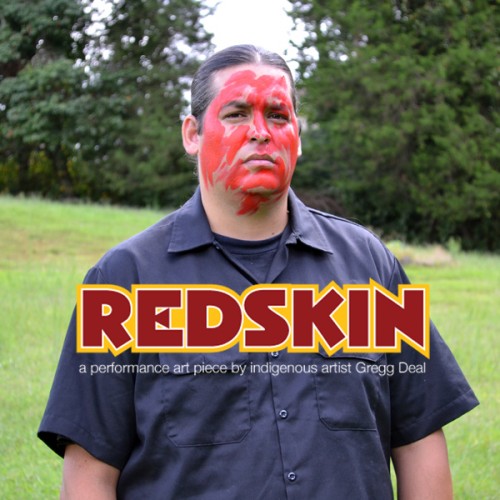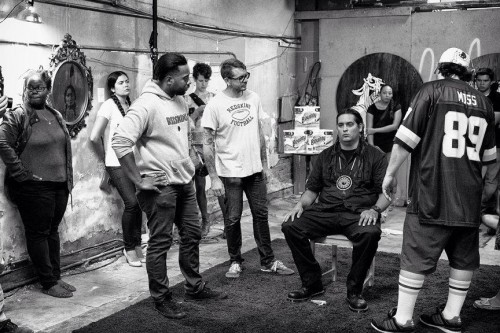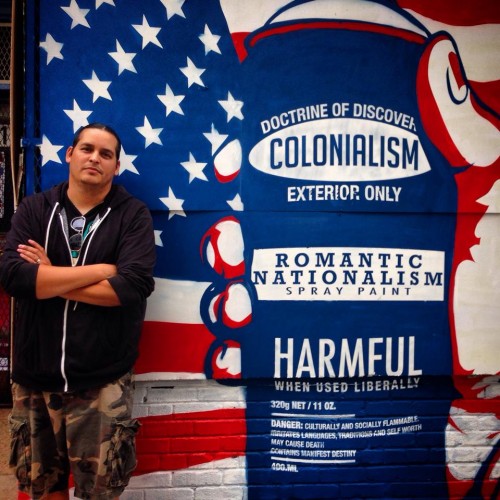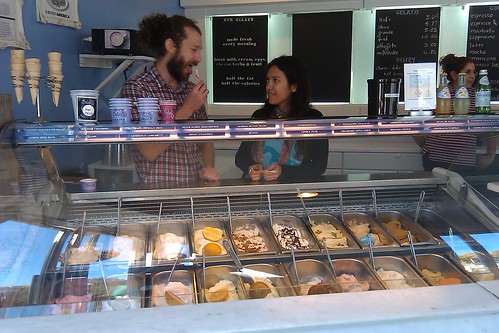
(c) Gregg Deal
Those who think the continuing movement to change the name of the local pro football team is a waste of time and trivial were clearly not at the recent Art All Night event here in the District. Secreted in one corner of the venue was local Indigenous artist Gregg Deal. His project, “Redskin,” took on the racial overtones of the team moniker and projected it at his audience.
What he, nor spectators or his helpers predicted was just how pointed it ended up being.
Deal first let me know of the project in early September. What initially struck me about his proposed performance piece was the fact he was willingly subjecting himself to some serious abuse. Natives in the area–as well as those protesting football games elsewhere in the country–have always been subjected to abuses by team fans, especially if they’re open about their opposition to the name. (Witness the reactions by fans, as recalled by several Natives, during a recent taping for The Daily Show.)
So why do it, especially in an art venue? “As people of color, or more specifically, Indigenous people, we deal with something called microaggression. It’s the needle pricks in our general American society and culture that says or does things that are offensive to Natives. They’re called ‘microaggression’ because they are passive aggressive enough to get by your average person, but still aggressive,” said Deal. “For example, when I worked at the National Museum of American Indian in 2004-2005, someone asked me if I still lived in a Tipi. This would be microaggression because it’s an insane questions that is based on stereotypes, but it’s also a statement about what this person believes quantifies me as an Indigenous person.”
The term ‘redskin,’ painted faces and faux headdresses, drunken war chants – these are all examples of microaggression. Deal’s performance piece was meant to use all of these abuses, commonly found in tailgate parties at FedEx Field and used by team fans around the world, over an eight-hour period. “I ended up calling it after just over four hours,” said Deal. “All of us–my friends who were helping me and myself–were just mentally and psychologically drained from the experience.”
Bryce Huebner, an Associate Professor at Georgetown University, was one of Deal’s assistants who played a part of one of the abusive fans. “I said things that I would never say in real life, in hopes of making it clear how ugly and harmful the casual racism against indigenous people in the United States is,” he said. “I was struck by how difficult it was to start playing that role, when I arrived my heart was pounding and I could hardly speak; but more troubling by far was the fact that it became easy to continue as I started to play off of the other actors. There’s an important lesson there: if you surround yourself with people who espouse hostile attitudes, it’s much easier to adopt those attitudes yourself.”
Deal said a lot of the audience mentioned to him how truly real it felt, watching it unfold, and he agreed. “After it got rolling, the invective felt truly real, like a few situations I’ve found myself in around the District.” When I mentioned that a Huffington Post review said it was unauthentic because he had used his friends as the antagonists, Deal laughed. “They should’ve been in my place, then. It certainly felt real to me.”

Deal (seated) in the middle of his “Redskin” performance. (c) Darby
Tara Houska, a board member of Not Your Mascots and a big proponent of the name change movement in the District, was one of the audience members. “The experience of watching Indigenous-based racism being hurled at a Native was difficult, to say the least,” she said. “Some of those phrases hit too close to home, and brought me back to moments in which I’ve experienced racism. At times, it was hard to keep in mind that it was a performance. I wanted to yell at the antagonizers to back off, and felt the hurt Gregg must have been feeling.”
Both Houska and Deal were also participants in the recent Daily Show segment that showed a panel of team fans and a panel of Indigenous people who, after separate discussions, confronted each other through the show’s direction. The segment has had mixed reaction in the press, with a lot of sympathy generated for the four white fans (who all self-identified as some fraction of various tribes, but with no real knowledge of their heritage – or, in one case, how generational fractions work). The incidents taped at FedEx field later between some of the Native panelists (specifically, the 1491s) and fans weren’t shown, which is unfortunate.
“Honestly, both the Daily Show and my art performance felt very similar,” said Deal. “The racism against Indigenous people in this country is so ingrained it it’s culture that the only way a team could exist as a mascot (which is defined as a clown, a court jester, by the way…nice ‘honor’) in the first place. The Washington Redskins–and other Indian mascots–are a really good illustration of not only how disconnected America is from it’s own history, but how disconnected it is from the issue of equality towards Indigenous people is. We are literally sitting on an issue where a significant amount of this country’s Indigenous are saying ‘it’s offensive’ and the answer is ‘no, it’s not offensive at all!'”

Gregg Deal with “A Nice Can of Colonialism”
Deal went on to say the whole movement to change the name isn’t really about offense, but about equality. “What you’re looking at is the tip of a very big iceberg of issues that are simply illustrated by this specific issue. The fact that we don’t seem to own our identity enough for someone to allow us to assert that identity appropriately, but that a corporate sports team is making billions from our image and likeness and has the audacity to fly it under the flag of honor is insanity,” he said. “Let’s be honest here, it’s not about honor, tradition, or any other lame excuse Dan or his constituents are saying. It’s about money, and the fans have all bought into supporting one of this country’s financial top one percent.”
Houska felt that Deal’s passion really came through in his performance piece, and she applauded him for taking a stand in such a public way. “I think it was a very in-your-face method to get locals aware that Natives experience racism, including the racist imagery and name of the Washington team,” she said. “We have all experienced being belittled and told to ‘get over it.’ I hope that people walked away with a sense of understanding that microaggression is a very real and damaging thing. And how it feels to be deluged by caricatured Natives via the Washington football team and having no say in it, despite being the subject of that caricature.”
Deal agreed. “I believe the term REDSKIN, if it belongs anywhere…it belongs to Indigenous people. In the same way the Black community essentially own the N-word,” he said. “While there are different schools of thought on that word and it’s usage in the Black community, it’s understood that if you use that word outside the Black community, you’re a certain type of person. The word ‘redskin’ belongs to us, and it’s not up to [non-Indigenous people] how it’s used.”
For more information on the name change social media movement, visit Eradicating Offensive Native Mascotry, Not Your Mascots, or follow the #changethename hashtag on Twitter.


